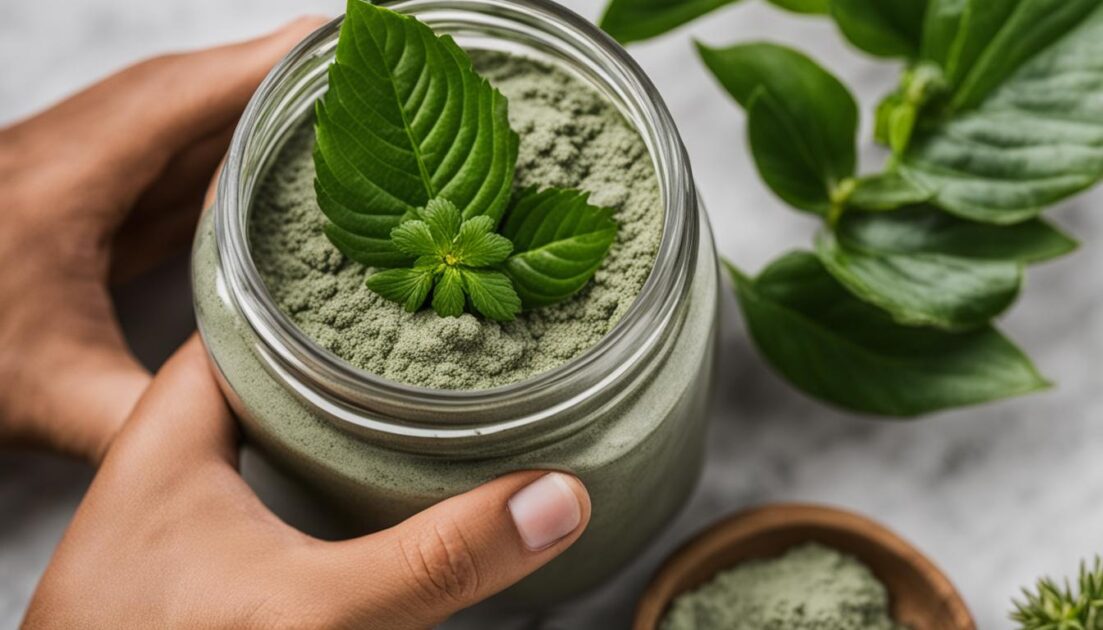Welcome to my article on the various benefits of bentonite clay. Bentonite clay is a natural substance that has gained popularity in recent years for its detoxifying and healing properties. This versatile clay can be used in skincare routines, as a natural remedy for various health issues, and even as a detoxifier for heavy metals. Let’s explore the amazing benefits of Bentonite clay and how it can enhance your overall well-being.
Key Takeaways:
- Bentonite clay offers numerous benefits for both skincare and health.
- It has detoxifying properties that can help cleanse the body.
- When used in skincare, it can purify the skin and soothe inflammation.
- There is potential for bentonite clay to aid in treating digestive issues and diaper rash.
- However, it is important to use it responsibly and consult a healthcare professional if needed.
Potential Health Benefits of Bentonite Clay
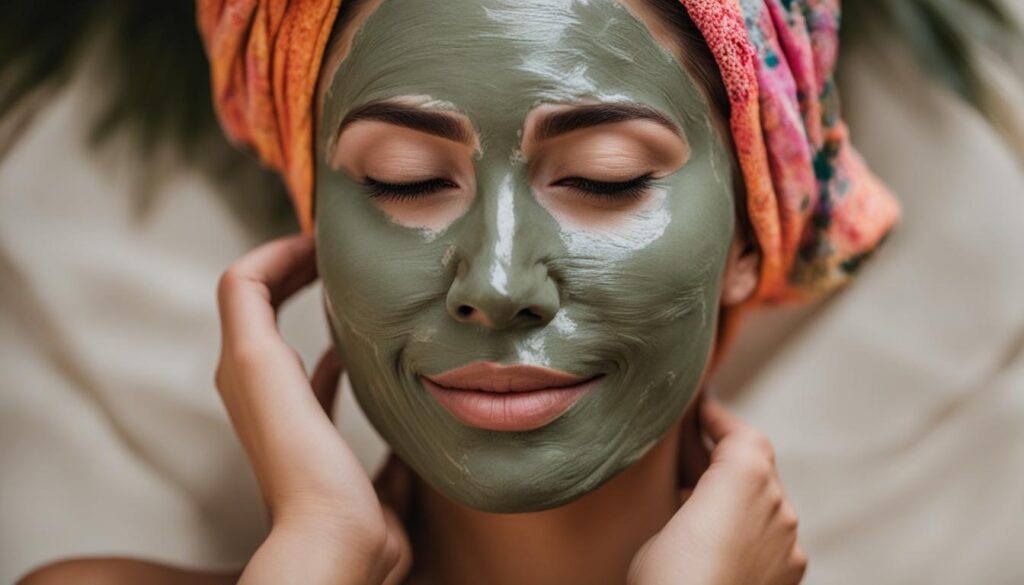
Research suggests that bentonite clay offers a wide range of potential health benefits. This natural clay has gained popularity for its detoxifying properties and healing effects. Let’s explore the various ways in which bentonite clay can benefit your health and well-being.
Detoxification and Adsorption of Toxins
Bentonite clay possesses remarkable detoxifying properties that make it an effective natural detoxifier. It works by adsorbing toxins and impurities, helping to remove them from your body. This process can help cleanse your system and promote overall well-being.
Healing Properties for Skin Conditions
Bentonite clay has been used for centuries in natural beauty remedies due to its healing properties. Its ability to absorb oils and impurities from the skin makes it an excellent choice for treating various skin conditions. Whether you’re dealing with acne, rashes, or irritated skin, bentonite clay can provide soothing relief and promote healing.
Promotes Gastrointestinal Health
Bentonite clay has shown promise in treating digestive issues such as diarrhea. Its ability to adsorb toxins and bacteria in the gut can help alleviate symptoms and restore digestive balance. Additionally, it may be effective in cases of Clostridium difficile (C. diff) infection, a bacterial infection that causes severe diarrhea.
Reduces Cholesterol Levels
Studies have suggested that bentonite clay may play a role in reducing cholesterol levels. By binding to cholesterol molecules, it may help lower their absorption in the body. However, more research is needed to fully understand its impact on cholesterol management in humans.
Removes Heavy Metals from the Body
Bentonite clay has been studied for its ability to remove heavy metals like lead and cadmium from the body. Animal studies have shown promising results, but further research is required to determine its effectiveness in humans. Removing heavy metals from your system can help improve overall health and well-being.
In conclusion, bentonite clay offers a multitude of potential health benefits. Its detoxifying properties, healing effects on the skin, and potential for gastrointestinal health, cholesterol management, and heavy metal removal make it a valuable natural remedy. However, while the existing research is promising, more studies on human models are needed to fully understand and harness the power of bentonite clay for optimal health.
Using Bentonite Clay for Skincare

Bentonite clay has gained popularity in the skincare industry due to its impressive benefits. This natural clay has the ability to adsorb oils and bacteria from the skin, making it a valuable ingredient in various skincare products.
One of the key skincare benefits of bentonite clay is its ability to remove impurities from the skin. By drawing out toxins and dirt from the pores, it helps to unclog them and reduce the occurrence of acne breakouts. The clay’s healing properties also help soothe inflamed skin, making it an ideal option for those with sensitive or irritated skin.
Many commercial facial masks contain bentonite clay as an active ingredient. These masks provide a convenient way to incorporate the clay into your skincare routine. Alternatively, you can make your own homemade masks by mixing bentonite clay with water or other natural ingredients like apple cider vinegar or honey.
To use bentonite clay for skincare, apply a thin layer of the clay mask to your face and leave it on for about 20 minutes. Rinse it off thoroughly with warm water to reveal refreshed and revitalized skin. For best results, use the mask two or three times per week to purify and detoxify your skin.
While the skincare benefits of bentonite clay are widely recognized, it’s important to note that more research is needed to fully establish its effectiveness as an acne treatment. Consulting with a skincare professional can provide personalized recommendations and ensure safe usage for achieving the best results.
Benefits of Bentonite Clay for Skincare:
- Removes impurities and detoxifies the skin
- Reduces acne breakouts
- Soothes inflamed and irritated skin
Using bentonite clay masks can help purify and revitalize your skin, leaving it feeling refreshed and renewed.
Bentonite Clay for Poison Ivy Rash
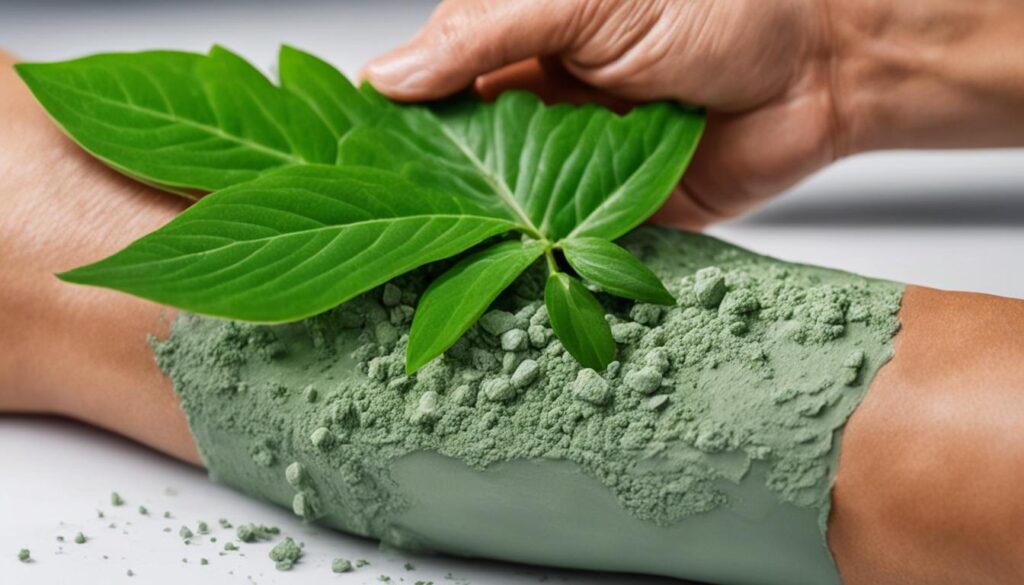
Bentonite clay offers natural relief for individuals suffering from poison ivy rash, soothing the skin and reducing irritation and itching caused by allergic reactions. When encountered with poison ivy, it is essential to wash the affected area thoroughly with soap and water to remove any traces of the irritating plant oil, urushiol.
After cleansing, the application of a bentonite clay paste can provide much-needed relief and promote the healing process. Simply mix the clay with a small amount of water to form a paste-like consistency. Apply the paste to the affected area, ensuring complete coverage, and gently spread it out like a thin layer. For improved effectiveness and easy removal, cover the clay with a clean bandage or gauze pad.
To achieve optimal results, it’s recommended to apply the bentonite clay paste several times a day until the rash subsides. The clay’s healing properties help reduce redness, alleviate inflammation, and soothe the skin, promoting faster recovery from the discomfort caused by the poison ivy rash.
Benefits of Using Bentonite Clay for Poison Ivy Rash:
- Reduces redness and inflammation
- Soothes itching and irritation
- Promotes faster healing
- Offers natural relief without harsh chemicals
Cautions and Considerations:
While bentonite clay is generally safe to use, it’s important to ensure the clay is of high quality and free from contaminants. Always choose reputable brands that prioritize product quality and safety. Additionally, if you experience any adverse reactions or the rash persists, it is recommended to consult a healthcare professional for further guidance.
Bentonite Clay for Weight Loss
Some people believe that consuming bentonite clay can aid in weight loss. However, the evidence is mixed, with most studies conducted on animals. While bentonite clay may have some benefits for digestion and detoxification, reducing calorie intake and increasing physical activity levels are still the best methods for losing weight. It is important to consult a healthcare professional before using bentonite clay for weight loss or any other medical purposes.
The idea of using bentonite clay for weight loss has gained popularity in recent years, with proponents claiming that it can help detoxify the body and promote fat loss. However, there is limited scientific evidence to support these claims.
Bentonite clay is often consumed as a supplement or added to drinks for its alleged detoxifying properties. It is believed to bind to toxins and impurities in the digestive system, helping to eliminate them from the body. By removing these toxins, some people believe that bentonite clay can improve digestion, boost metabolism, and aid in weight loss.
However, the effectiveness of bentonite clay for weight loss is still uncertain. Most of the studies on its weight loss potential have been conducted on animals, with few human studies available. Therefore, it is essential to approach the topic with caution and consult a healthcare professional before incorporating bentonite clay into your weight loss regimen.
While bentonite clay may offer some benefits, it is important to remember that weight loss is a complex process that requires a comprehensive approach. A balanced diet, regular exercise, and lifestyle modifications are key factors in achieving and maintaining a healthy weight. The use of bentonite clay should be seen as a complementary treatment rather than a standalone solution.
In conclusion, while some people believe that bentonite clay can aid in weight loss, the evidence is inconclusive. It is essential to consult with a healthcare professional before using bentonite clay for weight loss or any other medical purposes. Remember, adopting healthy lifestyle habits is the most effective way to achieve sustainable weight loss.
Bentonite Clay for Digestive Health
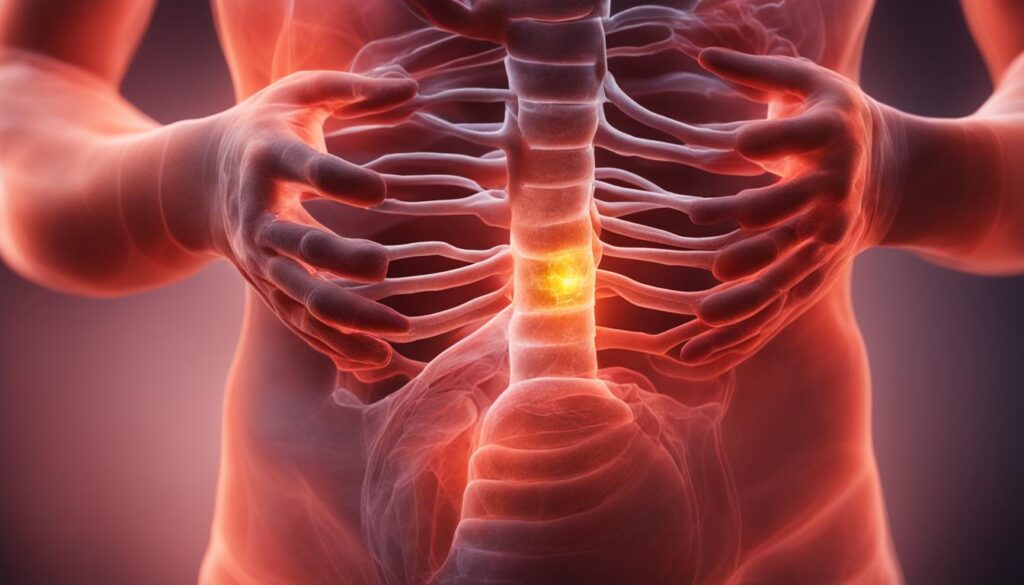
Bentonite clay is a versatile natural remedy with potential benefits for digestive health. It has been studied for its ability to regulate the digestive tract, offering relief for conditions such as irritable bowel syndrome (IBS) and diarrhea.
Bentonite clay has detoxifying properties that can help alleviate symptoms of IBS and diarrhea.
When ingested, bentonite clay works by adsorbing toxins and bacteria in the gut, enhancing the body’s natural detoxification process. It can help promote a healthy digestive system by eliminating harmful substances and supporting regular bowel movements.
Bentonite clay acts as an effective natural detoxifier for the digestive system.
Studies have shown that bentonite clay has been particularly effective in combating diarrhea caused by viruses like rotavirus and Clostridium difficile (C. diff). By binding to the toxins and pathogens responsible for diarrhea, bentonite clay can help alleviate symptoms and promote faster recovery.
Bentonite clay can provide relief for diarrhea caused by viral infections such as rotavirus and C. diff.
However, it is important to consult a healthcare professional before using bentonite clay for digestive issues. They can provide guidance on proper dosage and ensure overall safety, especially for individuals with existing medical conditions or who are taking medications.
Adding bentonite clay to your wellness routine can help support a healthy digestive system and provide relief from digestive discomfort. It is important to note that while bentonite clay shows promise in promoting digestive health, more research is needed to fully understand its mechanisms of action and determine the optimal usage.
Bentonite Clay for Diaper Rash
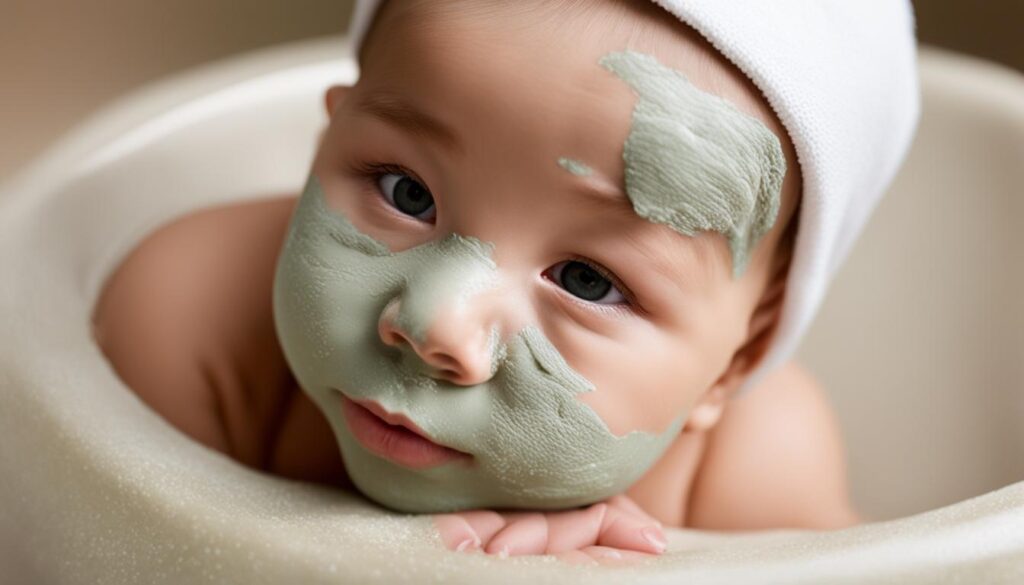
When it comes to soothing your baby’s delicate skin, natural remedies can be a gentle and effective solution. Bentonite clay, known for its numerous benefits, can also help alleviate diaper rash in babies. Studies have shown that incorporating bentonite clay into barrier creams can enhance their antibacterial properties, reducing diaper rash symptoms and promoting healing.
Diaper rash is a common occurrence among infants, usually caused by prolonged exposure to wet diapers, friction, or irritation from urine and feces. The soothing properties of bentonite clay can help provide relief by reducing redness, inflammation, and discomfort.
How to use bentonite clay for diaper rash:
- Gently clean your baby’s skin with mild soap and warm water.
- Pat the area dry with a soft towel.
- Apply a thin layer of barrier cream containing bentonite clay to the affected area.
- Ensure that the cream covers the entire rash.
- Secure a clean diaper to protect the skin.
Reapply the bentonite clay-containing cream with each diaper change until the rash subsides. It is important to consult a healthcare professional before trying any new remedy or product on your baby’s skin to ensure compatibility and safety.
Incorporating bentonite clay into barrier creams can provide relief from diaper rash symptoms and promote healing. However, it’s always advisable to consult a healthcare professional before applying any new remedy or product on your baby’s skin.
Bentonite Clay as a Sunscreen Ingredient

While the FDA does not approve bentonite as a sunscreen ingredient, research suggests that clay-based sorbents containing bentonite may provide UV protection and increase a sunscreen’s water resistance. Additionally, they may enhance adherence to the skin, providing added protection against sun exposure. However, it is important to use FDA-approved sunscreens alongside clay-based products for full sun protection.
Research on Clay-based Sunscreen Products
Several studies have indicated the potential of clay-based sunscreens, including those with bentonite clay, in enhancing sun protection and improving the longevity of sunscreen application. These clay-based sorbents can form a physical barrier on the skin, which helps in reflecting or scattering the harmful UV rays, thereby reducing their penetration into the skin.
In addition to its UV protection properties, the inclusion of bentonite clay in sunscreen formulations has shown promise in increasing water resistance. The clay particles have adsorbent properties that can absorb moisture, preventing the sunscreen from easily washing off when exposed to water or sweating. This can be particularly beneficial for individuals engaging in water activities or in hot and humid environments.
The Role of Bentonite Clay in Skin Protection
Bentonite clay’s ability to adhere to the skin offers an added layer of protection against sun exposure. When applied topically, the clay forms a thin film that can help shield the skin from harmful UV radiation. Moreover, due to its natural absorbent properties, bentonite clay can help reduce oiliness on the skin, promoting a matte appearance.
Bentonite clay, when used in conjunction with FDA-approved sunscreens, can provide an effective and natural solution for individuals seeking additional sun protection and water resistance.
Using Clay-based Sunscreen Products
When using sunscreen products containing bentonite clay or any other clay-based ingredient, it is essential to follow the instructions and recommendations provided by the manufacturer. Apply the sunscreen generously to all exposed areas of the skin and reapply as directed, especially after swimming or perspiring heavily.
It is worth noting that while clay-based sunscreens can offer certain benefits, they should not be relied upon as the sole method of sun protection. The American Academy of Dermatology recommends practicing comprehensive sun protection strategies, including seeking shade, wearing protective clothing, and using broad-spectrum sunscreens with a Sun Protection Factor (SPF) of 30 or higher.
| Pros | Cons |
|---|---|
| UV protection | Not FDA-approved as a sunscreen ingredient |
| Enhanced water resistance | Should be used alongside FDA-approved sunscreens |
| Adherence to the skin | May not provide complete sun protection on its own |
Bentonite Clay for Detoxification of Heavy Metals
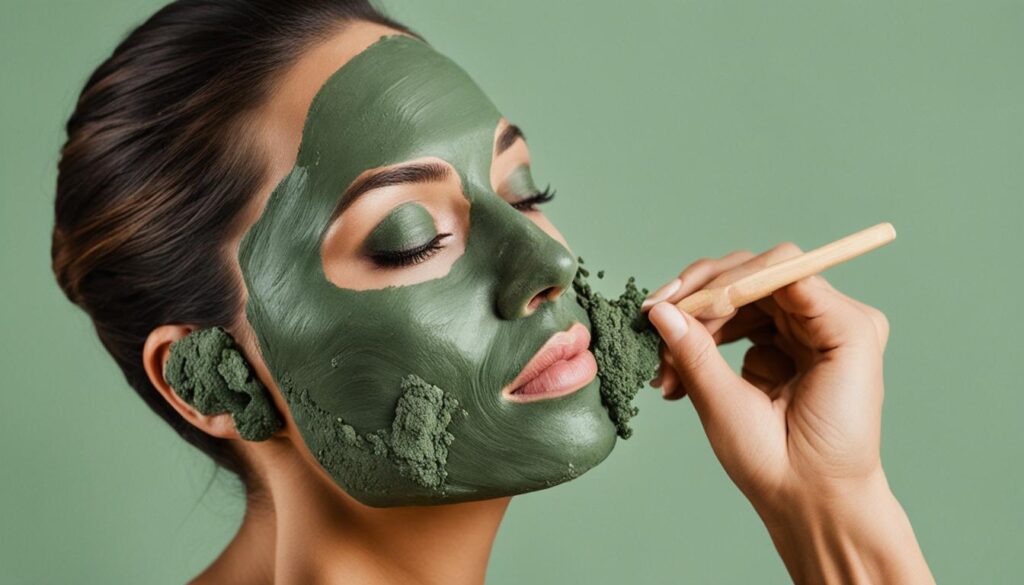
Bentonite clay offers effective natural detoxification, making it a popular choice for those seeking to remove heavy metals from their bodies. Studies have shown that this powerful clay has the potential to effectively reduce the levels of toxic elements like lead and cadmium.
Animal studies have demonstrated the effectiveness of bentonite clay in removing heavy metals from the body. However, further research is needed to establish its full capabilities in humans. Consulting a healthcare professional before using bentonite clay for detoxification purposes is crucial to ensure proper usage and dosage.
Detoxification is an essential process for maintaining overall health and well-being. When heavy metals accumulate in the body, they can have detrimental effects on various organ systems. Bentonite clay’s ability to bind to heavy metals and facilitate their elimination is a testament to its healing properties.
Incorporating bentonite clay into your detoxification routine may help cleanse your body of harmful heavy metals. However, it is important to note that using bentonite clay as a detoxifier should be done under the guidance of a healthcare professional to ensure safety and efficacy.
| Benefits of Bentonite Clay for Heavy Metal Detoxification | How to Use Bentonite Clay for Detoxification |
|---|---|
|
|
When using bentonite clay for detoxification, it is important to combine it with a healthy lifestyle, including a balanced diet and regular exercise. This holistic approach can enhance the effectiveness of the detoxification process and promote overall well-being.
Bentonite Clay for Lowering Cholesterol
While bentonite clay is primarily known for its skincare benefits, recent studies have explored its potential role in lowering cholesterol levels. These studies, conducted on animal models, have suggested that combinations of bentonite clay with other natural ingredients may have a positive effect on reducing cholesterol levels.
However, it is important to note that further research is needed to determine if these findings hold true in human models. The impact of bentonite clay on cholesterol levels in humans is still inconclusive, and it is always recommended to consult a healthcare professional before using bentonite clay or any other natural remedies as a substitute for medical treatment for high cholesterol or heart disease.
While bentonite clay holds promise as a natural remedy, it is essential to approach cholesterol management under the guidance and supervision of a healthcare professional. They can provide personalized advice based on your individual health profile and develop a comprehensive plan that includes evidence-based treatments and lifestyle modifications.
Stay tuned for more updates on the latest research and developments regarding the use of bentonite clay as a natural remedy.
Safety Considerations for Using Bentonite Clay
When it comes to using bentonite clay, it is important to keep safety in mind. While the majority of bentonite clay products are safe for topical use, it is crucial to choose reputable brands. Not all bentonite clay products are regulated by the FDA, so conducting research and selecting trusted sources is essential.
One potential concern is the presence of heavy metals in some bentonite clay products. These trace amounts of heavy metals can be harmful to human health. To minimize the risk, it is advisable to opt for high-quality bentonite clay from reliable manufacturers who regularly test their products for heavy metal contamination.
Moreover, if you plan to use bentonite clay internally, such as for digestive health or detoxification, it is crucial to consult a healthcare professional. They can provide guidance on safe usage, appropriate dosage, and any potential interactions with medications or existing health conditions.
While bentonite clay offers many benefits as a natural beauty remedy, practicing caution and seeking professional advice can help ensure a safe and enjoyable experience.
FAQ
What are the benefits of using bentonite clay?
Bentonite clay has various benefits, including its detoxifying properties, skincare benefits, and healing properties. It can purify and detoxify the skin, reduce acne breakouts, and soothe inflamed skin. Bentonite clay can also be used to treat rashes, such as diaper rash, and alleviate symptoms of digestive issues.
What are the potential health benefits of bentonite clay?
Research suggests that bentonite clay may have potential health benefits, such as detoxification, treating conditions like Clostridium difficile infection, reducing cholesterol levels, and removing heavy metals from the body. However, most of the research has been conducted on animals, and further studies are needed to determine its full extent of benefits in humans.
How can bentonite clay be used for skincare?
Bentonite clay can be used in skincare as a natural remedy for purifying and detoxifying the skin. It can remove impurities, reduce acne breakouts, and soothe inflamed skin. Bentonite clay masks, applied for about 20 minutes, two or three times per week, can provide these benefits.
Can bentonite clay be used to treat poison ivy rashes?
Yes, bentonite clay can be used to alleviate poison ivy rashes. After washing the affected area with soap and water, applying a paste of bentonite clay can help reduce redness, irritation, and itching caused by allergic reactions to poison ivy. The clay should be covered with a clean bandage or gauze pad and applied several times a day until the rash subsides.
Can bentonite clay help with weight loss?
While some people believe that consuming bentonite clay can aid in weight loss, the evidence is mixed, mostly based on animal studies. It’s important to note that reducing calorie intake and increasing physical activity levels are still the best methods for losing weight. Consult a healthcare professional before using bentonite clay for weight loss purposes.
How can bentonite clay be used for digestive health?
Bentonite clay may help regulate the digestive tract by adsorbing toxins and bacteria in the gut, potentially alleviating symptoms of conditions like irritable bowel syndrome and diarrhea. It has also been found effective against diarrhea caused by viruses such as rotavirus and Clostridium difficile. However, it is important to consult a healthcare professional before using bentonite clay for digestive issues.
Can bentonite clay be used to treat diaper rash?
Yes, bentonite clay can be used to alleviate diaper rash in babies. It enhances the antibacterial effect of barrier creams and helps reduce diaper rash symptoms and promote healing. However, always consult a healthcare professional before applying any new remedy or product on a baby’s skin.
Is bentonite clay considered a sunscreen ingredient?
While the FDA does not approve bentonite as a sunscreen ingredient, research suggests that clay-based sorbents containing bentonite may provide UV protection and increase a sunscreen’s water resistance. Additionally, they may enhance adherence to the skin, providing added protection against sun exposure. However, always use FDA-approved sunscreens alongside clay-based products for full sun protection.
Can bentonite clay help in removing heavy metals from the body?
Bentonite clay has shown promise in removing heavy metals like lead and cadmium from the body, based on animal studies. However, more research is needed to establish its extent of effectiveness in humans. Consult a healthcare professional before using bentonite clay for detoxification purposes.
Can bentonite clay lower cholesterol levels?
Some studies in animal models suggest that combinations of bentonite clay with other natural ingredients may have a cholesterol-lowering effect. However, more research is needed to determine if this effect holds true in human models. It is important to consult a healthcare professional before using bentonite clay or other natural remedies as a substitute for medical treatment for high cholesterol or heart disease.
Are there any safety considerations when using bentonite clay?
While bentonite clay is generally safe to use on the skin, it is important to choose reputable brands, as the FDA does not regulate all bentonite clay products. Some products may contain traces of heavy metals, which can be harmful to human health. Additionally, always consult a healthcare professional before using bentonite clay internally and ensure safe usage and appropriate dosage.
